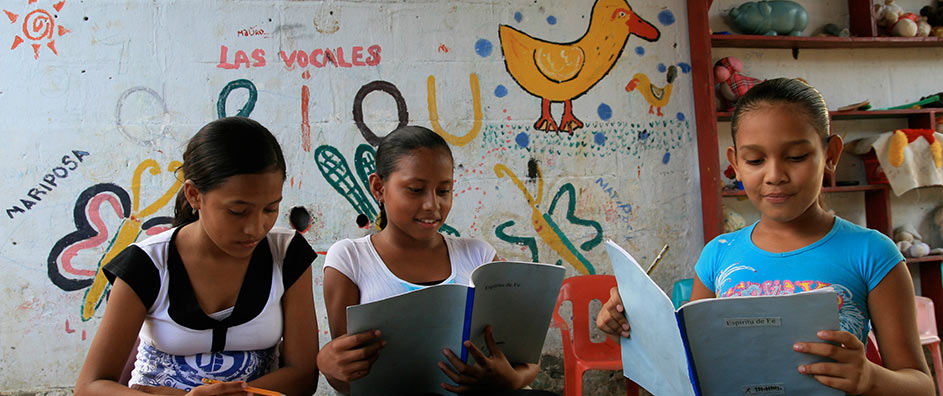The Colombian landscape, with its verdant mountains and dynamic cultures, has long been marred by conflict. The nation’s tumultuous history demands an examination of how peace can be attained in a tangible and sustainable manner. One illuminating perspective comes from the Baha’i teachings, which provide profound insights into community building and unity, serving as a beacon amidst the tumultuous seas of discord.
To comprehend the Baha’i role in fostering peace in Colombia, it is essential first to delve into the core tenets of Baha’i philosophy, including the oneness of humanity, the unity of religion, and the importance of justice. These principles can serve as foundations for reconstructing Colombian society, allowing for the transition from a history of division towards one of collective healing.
At the heart of Baha’i teachings is the concept of the oneness of humanity. This principle asserts that all people are interconnected, that borders drawn by man often obscure a fundamental unity. In the context of Colombia, fraught with polarization and mistrust, the emphasis on unity can serve as a catalyst for reconciliation. The historical strife among diverse factions—the government, guerilla groups, and paramilitaries—has created an atmosphere thick with suspicion and discord. Baha’is advocate for dialogue and understanding, positing that empathy and compassion can transcend historical grievances.
Moreover, integrating the idea of the unity of religion into Colombia’s sociopolitical landscape offers a profound opportunity for healing. It is an acknowledgment that spiritual truths, though expressed through various faiths, share a fundamental essence. Baha’is view all religions as chapters in a single textbook of divine revelation. For Colombia, a nation steeped in Catholic tradition, recognizing the validity of spiritual insights from various beliefs could encourage collaboration instead of competition. By promoting the Baha’i perspective that divine teachings are universal, barriers between conflicting groups can be dismantled, leading to a more harmonious coexistence.
Justice, another fundamental concept in Baha’i teachings, plays a critical role in social and political reform. In Colombia, prevailing injustice has perpetuated resentment. The Baha’i emphasis on equitable treatment for all, regardless of socio-economic status or ethnicity, aligns perfectly with the aspirations of a populace yearning for fairness. Distributive justice—ensuring that resources and opportunities are fairly shared—can lead to stabilizing communities, thus diminishing the propensity for violence. Baha’i initiatives could facilitate community dialogues that address grievances, resulting in mutual understanding and restorative justice practices.
While the theoretical framework derived from Baha’i teachings provides illuminating pathways towards peace, practical measures and the active involvement of Baha’is are paramount. Engaging in grassroots movements, Baha’is can become catalysts for change, transforming ideals into actionable strategies. Educational initiatives are particularly significant. By promoting literacy and critical thinking, Baha’is can empower individuals to become informed and active participants in their communities, fostering a sense of ownership over peace-building efforts.
Another crucial initiative lies within the realm of interfaith dialogue. Given Colombia’s rich tapestry of diverse beliefs, Baha’is can spearhead discussions among various religious groups, encouraging an atmosphere of mutual respect and cooperation. Such dialogues can diminish sectarian divides and create avenues for collaborative community projects, thus reinforcing social bonds and understanding.
In addition, the advancement of women’s rights, a cardinal value in Baha’i teachings, is vital in constructing a robust foundation for peaceful coexistence in Colombia. Empowering women can transform societal structures, promoting equality and inclusivity that ultimately lead to holistic development in all realms—social, political, and economic. The contributions of women in conflict resolution and community-building efforts can not be overstated; their perspectives and experiences enrich the peace discourse, providing a more complete understanding of the challenges faced by various segments of society.
Furthermore, nurturing a culture of consultation aligns seamlessly with Baha’i principles, where collective decision-making is valued over the whims of authority. In Colombia, adopting a model of inclusive governance that incorporates a broader spectrum of voices can lay the groundwork for sustainable peace efforts. Baha’is are trained in the art of consultation; this model encourages open and respectful communication that seeks the truth collaboratively—a necessary ingredient for resolving conflicts and fostering long-lasting relationships.
As the winds of change sweep over Colombia, the Baha’i community stands at the forefront, equipped with an arsenal of spiritual and practical tools aimed at healing the national psyche. By embracing the principles of unity, justice, empowerment, and consultation, the Baha’is advocate for a holistic vision that not only mitigates conflict but also enriches the cultural tapestry of Colombian society.
In culmination, as Colombia navigates its complex path towards peace, Baha’i teachings offer a versatile roadmap. The historical legacy of strife can serve as fertile ground for a burgeoning culture of unity and justice, wherein the myriad voices of its people harmonize into a chorus of coexistence. Acknowledging the interconnectedness of humanity is not merely a lofty aspiration; it is an imperative that, if taken to heart, can transform the Colombian landscape into a vibrant tapestry of peace, illuminating the way for generations to come.
